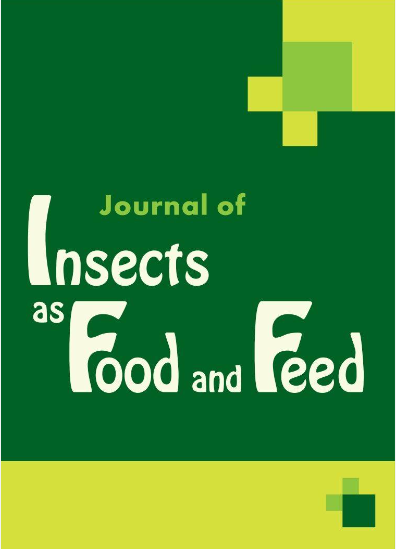US consumer perceptions of insects as livestock feed: ethical considerations for insects
IF 3.5
3区 农林科学
Q1 ENTOMOLOGY
引用次数: 0
Abstract
Insects have potential to be integrated into livestock production systems as feed. However, to be viable as feed, insects must be mass-reared in a ‘mini-livestock’ system. As these mass-rearing systems are relatively new, industry standards and welfare regulations are not yet in place, leaving insect welfare-related questions open. Given the importance of consumer attitudes to the social legitimacy of insect production, an analysis of consumers’ ethical perceptions of producing insects as livestock feed is warranted. The objectives of this study were to: (1) determine if US consumers support or oppose using insects as livestock feed, (2) determine if perceptions regarding insect welfare or ethics are reasons for opposition, and (3) identify US consumers’ perceived risks and benefits of using insects as livestock feed. We developed a quantitative electronic questionnaire-based survey and established reliability and validity prior to distribution. Distribution was achieved through convenience sampling to adult US consumers (n = 361). When asked if insects should be used as livestock feed, 34% of respondents were supportive, 52% were neutral, and 15% were opposed. Of those who were opposed (n = 53), 58% cited ethical concerns as their reason for opposition. Of respondents who were supportive or neutral towards using insects as livestock feed (n = 308), 29% reported livestock welfare and 26% reported insect welfare as perceived risks. Perceived benefits emphasised environmental sustainability. From our entire sample, 74% of respondents thought insects could feel pain, 23% did not know, and 4% did not think insects could feel pain. Gender, age, household income, education level, and previous knowledge were significant determinants () of whether or not respondents thought insects could feel pain. Our data highlight potential areas of opposition to developing the insect rearing industry in the US and suggests that producers have reason to establish practices that are perceived as creating high-welfare conditions for their insects.美国消费者对昆虫作为牲畜饲料的看法:昆虫的伦理考虑
昆虫具有作为饲料融入畜牧生产系统的潜力。然而,昆虫必须在 "小型家畜 "系统中进行大规模饲养,才能作为饲料使用。由于这些大规模饲养系统相对较新,行业标准和福利法规尚未出台,因此与昆虫福利相关的问题仍悬而未决。鉴于消费者态度对昆虫生产的社会合法性的重要性,有必要分析消费者对将昆虫作为家畜饲料生产的道德观念。本研究的目标是(1) 确定美国消费者是支持还是反对将昆虫用作家畜饲料,(2) 确定对昆虫福利或道德的看法是否是反对的原因,(3) 确定美国消费者对将昆虫用作家畜饲料的风险和益处的看法。我们开发了一种基于电子问卷的定量调查,并在发放前确定了调查的可靠性和有效性。我们通过方便抽样的方式向美国成年消费者(n = 361)发放了调查问卷。当被问及是否应将昆虫用作牲畜饲料时,34% 的受访者表示支持,52% 表示中立,15% 表示反对。在反对的受访者中(n = 53),58%的人将道德问题作为反对的理由。在对使用昆虫作为家畜饲料持支持或中立态度的受访者中(n = 308),29%的人认为家畜福利是他们认为存在的风险,26%的人认为昆虫福利是他们认为存在的风险。所认为的益处强调环境的可持续性。在所有样本中,74% 的受访者认为昆虫会感到疼痛,23% 的受访者不知道,4% 的受访者认为昆虫不会感到疼痛。性别、年龄、家庭收入、教育水平和以往的知识水平是决定受访者是否认为昆虫会感到疼痛的重要因素()。我们的数据强调了美国昆虫饲养业发展的潜在反对领域,并表明生产者有理由建立被认为能为昆虫创造高福利条件的做法。
本文章由计算机程序翻译,如有差异,请以英文原文为准。
求助全文
约1分钟内获得全文
求助全文
来源期刊

Journal of Insects as Food and Feed
Agricultural and Biological Sciences-Insect Science
CiteScore
7.00
自引率
17.60%
发文量
133
期刊介绍:
The Journal of Insects as Food and Feed covers edible insects from harvesting in the wild through to industrial scale production. It publishes contributions to understanding the ecology and biology of edible insects and the factors that determine their abundance, the importance of food insects in people’s livelihoods, the value of ethno-entomological knowledge, and the role of technology transfer to assist people to utilise traditional knowledge to improve the value of insect foods in their lives. The journal aims to cover the whole chain of insect collecting or rearing to marketing edible insect products, including the development of sustainable technology, such as automation processes at affordable costs, detection, identification and mitigating of microbial contaminants, development of protocols for quality control, processing methodologies and how they affect digestibility and nutritional composition of insects, and the potential of insects to transform low value organic wastes into high protein products. At the end of the edible insect food or feed chain, marketing issues, consumer acceptance, regulation and legislation pose new research challenges. Food safety and legislation are intimately related. Consumer attitude is strongly dependent on the perceived safety. Microbial safety, toxicity due to chemical contaminants, and allergies are important issues in safety of insects as food and feed. Innovative contributions that address the multitude of aspects relevant for the utilisation of insects in increasing food and feed quality, safety and security are welcomed.
 求助内容:
求助内容: 应助结果提醒方式:
应助结果提醒方式:


